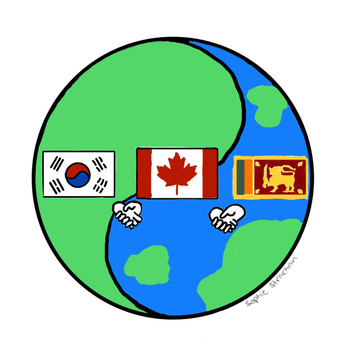We use cookies on this site to enhance your experience.
By selecting “Accept” and continuing to use this website, you consent to the use of cookies.

The International Cultural conversations enabled us to form new bonds and experience the insights our international friends have. We learned about South Korean and Sri Lankan culture because of the personal experiences Lisa and Yameen shared.
Our group experiences exposed us to diverse cultures, aided newcomer adaptation, and facilitated a deeper understanding of shared cultural differences. It allowed our group SSLY to foster new friendships with one another just like multiculturalism does among numerous cultures.
We started HR 261 hoping to learn what multiculturalism is in Canada, but because this concept is so complex and ever evolving, we are still left wondering. Over the course, we discussed the challenges of multiculturalism and how its dynamics are perpetually shifting. Throughout the conversations, we found one another attempting to see ourselves as newcomers arriving in a different country without any knowledge of it. Superficially, multiculturalism is viewed as appealing, but if not careful when incorporating other cultures into Canadian culture, could turn into assimilation. When discussing educational systems, we discovered that while Yameen's schooling was similar to Canada's, Lisa found it difficult to adjust. We recognized how quickly newcomers must adapt in order to blend in. We noticed that, although most Canadians tolerate other cultures, we do not accept them to the extent that we are willing to change our traditions to accommodate them. Rather, we permit cultures to practice on their own schedules but never as a community, which ultimately limits everyone’s ability to gain a deeper understanding of others’ cultures and truly become multicultural.
Cultural interaction and understanding are essential to multiculturalism because they make newcomers feel welcomed into society and enable everyone, regardless of culture, to better comprehend one another's outlooks. We learned how important communication is to establishing connections. When we discovered how much Lisa and Yameen understood about Canadian culture, our viewpoints shifted. We were astounded by the lack of information they received as well as how clichéd and unhelpful it was. Lisa and Yameen clarified that their expectations upon arriving in Canada differed greatly from what they had read about on paper. We realized that the key to the success of diversity is communication. It could be the root of cultural conflict or the source of diversity. Our understanding of other cultures depends on our early interpretations of them, and misinterpretation of that understanding breeds animosity. The conversations with Lisa and Yameen emphasized how essential it is to comprehend and value other perspectives. These dialogues enhanced our personal understanding and provided a forum to explore others’ experiences, viewpoints and cultural narratives. Reflecting on our conversations, it becomes apparent that multiculturalism exceeds mere superficial acceptance, requiring an extensive understanding of its multifaceted dynamics.
We found that recognizing core values is vital to understanding multiculturalism. During these conversations, acknowledging cultural and upbringing influences on individual values became paramount. Disparate values are not necessarily incompatible, but rather unique perspectives offer profound insights. Understanding that values and beliefs may differ from yours is essential when speaking with people from different cultures. We need to keep an open mind if we want to understand why they place those values before others. As students and as Canadians, this course provided us with a deeper understanding of how cultures affect our values, and how newcomers’ values, as well as Canada’s values and perspectives, change when we converse about our beliefs and values; Lisa and Yameen mentioned “We have different cultural norms in our countries”. The foundation of multiculturalism is communication and understanding, and recognizing others' core values contributes to inclusivity and diversity.
These conversations always led us to the question of how these aspects of multiculturalism affect Canada’s national identity? We concluded that multiculturalism is more intricate than the blending of many different cultural backgrounds, and that appreciating it requires looking below its superficial elements. Multiculturalism is complex because it is abstract in nature and depends on how it is approached and implemented. We believe that fostering an accepting and diverse society by promoting discourse, welcoming different viewpoints, and exhibiting a degree of cultural sensitivity an help Canada effectively create its own collective identity, as opposed to being a nation built on numerous distinct cultural identities, and become truly multicultural.
Sophia Strachan, HR 261, Human Rights & Human Diversity, Brantford
Shem Gill, HR 261, Law and Society, Brantford
Chae Hyeon (Lisa) Lee, Laurier International : English Foundation, Brantford
Yameen, Wilfrid Laurier International College, Brantford